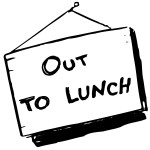Not too long ago, we went out to eat at a real, “sit-down” restaurant.
Because we were both a bit tired, we chose not to sit at any of those “stand-up” restaurants that do so poorly that they’ve had to sell all the chairs in order to purchase another batch of soybean for the burgers.
Actually, it was a long while ago, so long, in fact, that it was before the last Post Office rate hike and we were still using 34-cent stamps. Oh, my mistake. That was last week.
We went out to eat at one of those restaurants that takes your name and then calls you when your table’s ready. They ask all the important things, such as How many are in your party? Smoking or non-smoking? What’s the limit on your credit card? and Are you really going to bring that toddler in here?
Your response to the last two questions determines whether you sit somewhere suitable to your response to the first two questions, or sit out in the parking lot adjacent the garbage dumpster.
Then the host asked me the name to call when they had set up our folding table in the ally out back.
“Faircloth,” I said.
“Fairclaw?”
“FAIRCLOTH,” I reiterated.
“Fairclauf?”
“FAIR, CLOTH.” I could feel the tips of my ears turning red.
“What?”
“F-A-I-R-C-L-O-T-H,” I said, giving the appropriate cheer leading gesture for each letter, followed by a triple back hand spring into a back flip.
“Oh, Saircloth.”
After catching my breath from the gymnastics and resisting a fleeting urge to put someone in a headlock, I told the host, “‘Jones’ will do.”
This illustrates the constant problem my surname causes in everyday life. When I tell others my name, it undergoes some cloaking maneuver between my mouth and their brain synapses. When others try to read my name, its cloaking device causes them to see things that are not there. In these cases, my name become “Fairchild,” probably because of the celebrity, Morgan Fairchild. I can only speculate as to the things she’s been called.
Once, after purchasing a pair of shoes, I gave the cashier my name and asked him to hold the shoes while I continued to browse. When I came back for them, no one could find my shoes. Oddly enough, everyone on this occasion seemed to understand what my name was, but the original cashier did not. He had left after labeling my shoes “Bearclaw.”
Yes, I am a breakfast pastry. My cousins are Mr. Pop Tart and Mrs. Oat Meal.
It’s difficult to fathom how a name could be so problematic, especially one as simple as mine. Whenever people undergo an epiphany of understanding regarding my name they all exhibit the joy of discovery and exclaim either “Oh, it’s just like it sounds!” or “Oh, it’s just like it’s spelled!” and I get those headlock urges, again.
Faircloth actually means “dweller of fair cliff or hollow” (stop laughing) and our Faircloth forebears have included the wife of a British king and one of the men responsible for printing an edition of the Bible using the famous Gutenberg Press. Our lineage, though not full of presidents, celebrities, or even notorious criminals (although Lauch Faircloth, U.S. Congressman, is a distant relative), is a fairly proud one.
That is, proud until you discover that a relative made it into the Guinness Book of World Records for being named Legal Tender Faircloth.
“Mama, what you reckon we gon’ name this boy?”
“I don’t know, Papa. What’cha got in ya’ pocket?” After examining Papa’s grimy one-dollar bill, Mama pronounced “We’ll name him after the Secretary of the Treasury, Legal Tender.”
Mama apparently thought she would be able to carry the child to market and buy some pickled pigs feet with him.
“How ya’ gon’ pay for ’em feet, ma’am?”
“Why, Legal Tender, of course.”
Why couldn’t Papa have had some Lance crackers in his pocket?
Rob Faircloth recently received a billed addressed to “Fairsloph.”